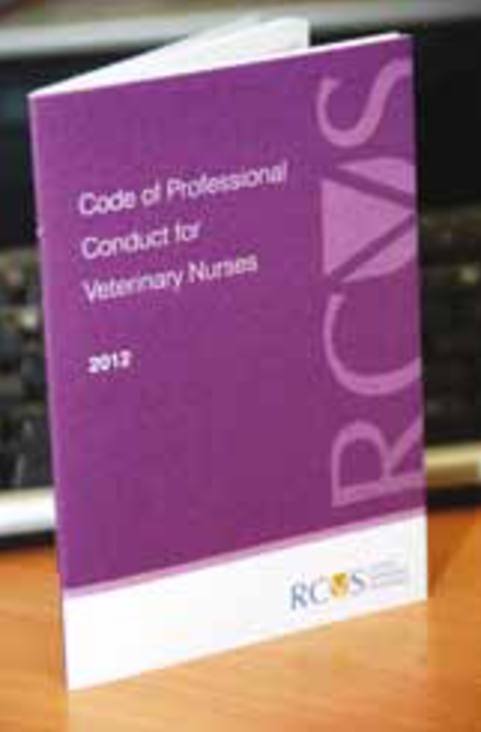
As the profession has developed, and expectations about the sort of guidance which regulators should produce have changed, it has become necessary to review the Guide to Professional Conduct for Veterinary Nurses. The result was the publication this April of succinct, principles-based Codes of Professional Conduct, which replace the Guides for both veterinary surgeons and VNs.
Both Codes are based on five principles key to veterinary practice: professional competence; honesty and integrity; independence and impartiality; client confidentiality and trust; and professional accountability. The VN Code includes a new declaration that all registered VNs (RVNs) must now make on joining the Register and which describes VNs’ professional responsibilities. Vets have always made a declaration on joining the Register; now both VNs and vets make the same professional commitment to animal care and welfare. Both Codes link throughout to supporting guidance, which consolidates the annexes and advice notes from the old Guides. Professional obligations have also been clearly differentiated from advice, through using consistent language and clearly distinguishing the Codes from the supporting guidance.
Consultation with the professions and feedback from VNs and vets in relation to their respective Codes was critical to the review process, particularly as the feedback suggested that both the VN and veterinary Codes should be clearly linked and consistent with each other, while still recognizing the unique position of VNs.
Several important changes to the draft Code were made in response to the consultation. For example, in Section 1, Veterinary nurses and animals, several clauses were combined, and a requirement for VNs to communicate with veterinary surgeons and each other to ensure the health and welfare of animals was added.
The new Codes also oblige vets and RVNs who are concerned about a professional colleague’s fitness to practise (whether through health or performance issues) to take steps to ensure that animals are not put at risk, and that the interests of the public are protected. This links to the Health Protocol and the Performance Protocol (see www.rcvs.org.uk/vn/health and www.rcvs.org.uk/vn/performance).
These Protocols mean that the College, like other regulators, has approaches it can take in cases where a person’s fitness to practise is affected by their health or poor performance, and where a public hearing may not be appropriate. These measures ensure that animals and the public are not put at risk, while allowing vets and RVNs to obtain the support and training needed. They may also be used in the rare cases where an individual has not addressed performance issues previously identified. Although we hope that such issues can be raised with the College by consent, we have also provided advice on raising concerns to the College through a supporting guidance note on ‘whistleblowing’.
A significant new obligation for RVNs is to tell the RCVS about any VNs who continue to undertake ‘Schedule 3’ activities despite being removed from the RCVS Register by the RVN Disciplinary Committee.
The Code makes explicit that VNs have continuing professional development (CPD) obligations, including a Period of Supervised Practice (PSP) for VNs returning to practice after 5 or more years away. During a PSP, nurses refresh their essential skills in practice prior to reassuming their full professional obligations as an RVN.
For the first time, there are requirements for clinical governance to form part of vets’ and VNs’ professional activities. Clinical governance broadly means a framework through which vets and VNs can make continual improvements to the services they offer. RVNs are also now required to maintain standards in practice at least equivalent to the Practice Standards Scheme’s core standards.
Having VNs’ involvement in preparing this Code means that we have been able to produce guidance relevant to all VNs, whether they are providing clinical care to patients, running veterinary practices, working in industry or teaching the next generation of nurses. Although the Code sets out obligations for RVNs, who accept professional accountability, we expect Listed VNs also to meet the standards within the Code. The Code of Professional Conduct for Veterinary Nurses is available online at www.rcvs.org.uk/VNcode.
